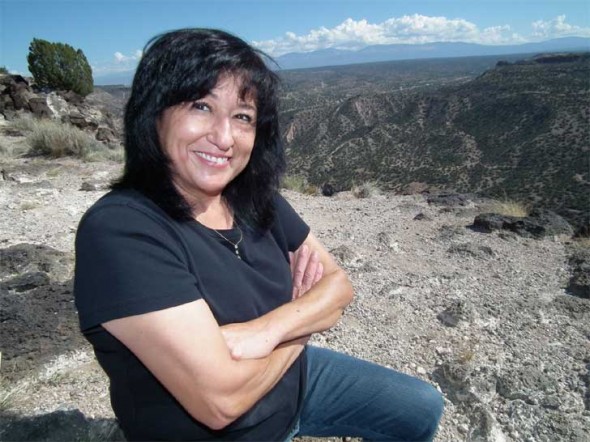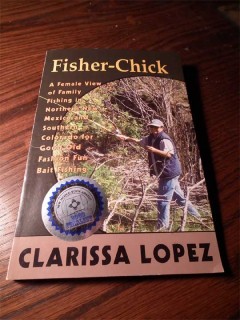Got fat, lazy, kids dominated by cell phones, captivated by video, stupefied by TV?
Maybe it’s time to drag them out of the house and teach them one of New Mexico’s favorite outdoor pastimes, like how to fish, the old fashioned way, with a simple pole and some bait down at the local fishing hole.
If so, then Espanola Valley author and angler, Clarissa Lopez, has got the fishing guide book for you. Simple, easy to understand instructions on how to cast, fish, use bait, handle a fish and more importantly, where to go!
Featuring dozens of family friendly fishing spots in northern New Mexico and southern Colorado, this guide makes getting out there a breeze and teaching kids to fish, effortless.
Lopez, 53, of La Mesilla, is one of three sisters and a brother born into a traditional Hispanic family living on a small family farm by the banks of the Rio Grande near Espanola.
Her father, Henry, a Jemez Electric Cooperative worker, passed down to her the simple joys of fishing, camping and playing outdoors by taking her on trips up into nearby Santa Clara Canyon and other nearby spots.
But many of today’s kids seem to lack the same experiences and may be missing out on some of the simpler joys in life like playing outside in the sunshine and learning about and respecting nature, she says.
So Lopez set out to pass down some of those old fashioned fishing skills along with some insider tips on where to go so that anyone can enjoy a day of fishing and relaxing in the great outdoors.
Her self-published book is titled “Fisher-Chick. A female view of family fishing in Northern New Mexico and Southern Colorado for good old fashioned fun bait fishing.” It was 2009 finalist for the New Mexico Book Awards and can be purchased online from her website at www.fisher-chick.com.
Inside, readers will find detailed instructions on how to reach 20 good, fishing locations including legendary northern New Mexico fishing spots like Canjilon Lakes, the Rio Chama, the Rio Brazos, Hopewell Lake and Lagunitas.
Lopez offers her own insights about fishing including why she does it and why others should too. She remarks that kids should never be “skunked” when fishing and one should not suffer a “cardiac” while getting there, hence the use of live bait and easily accessed waters.
And while Lopez thinks highly of worms and grasshoppers for catching fish she’s not above tossing one of her handmade, spinning lures armed with a single barbless hook into a steam governed by special restrictions.
Lopez is married to Rick, a retired Los Alamos Lab employee who has two sons, and they love to eat fish.
But Lopez preaches catch and release and uses barbless hooks or pinches the barbs on hooks simply because it makes releasing fish she doesn’t want to keep that much easier to release.
Lopez stresses the need to pick up and pack out trash to protect public lands for the future enjoyment of others. However she sees no need for further road closures in our national forests because it impedes access to the backcountry.
Her attitude is the government should simply abandon the roads and let people figure it out on their own.
Lopez, who also works at the Labs, offers tips on how to grow a good worm supply in your own backyard and how to collect and store grasshoppers for use.
She offers her experience that nothing works like a live hopper for eliciting a hard strike from a trout but in a minor oversight fails to note exactly how to impale one on a hook.
“Through the belly so the hook faces forward, that way it won’t come off when you’re casting,” she says. “It’s kind of icky.”
Lopez’s book contains handy packing lists for fishing and camping with the item “beer” dominating the top of the food category list and beans included at both lunch and dinner.
She illustrates with pictures how to tie on a hook using a loop to loop connection, offers tips on casting and fishing including her recommendation to use a closed face, spin caster for simplicity’s sake.
She uses nearly indestructible PVC pipe with removable end caps to store and transport her rods too.
And perhaps the best piece of advice her book offers is that upon showing up at the fishing hole one should immediately inquire of other anglers as to what they’re biting on.
Reading Lopez’s book is like spending a couple hours lakeside with an old timer, listening as he or she passes on knowledge and advice on how to fish and other related matters.
A visit to her site will reveal a collection of handmade lures for sale including the single, barbless, spinning lure in two weights, a real find for anyone who wants to fish quality waters like the San Juan River with a spin caster.
The site also boasts fishing lures made from discarded beer bottle caps, traditional treble hook, spoon spinning lures and a handy, foam hook caddy. There’s even forage caps sporting the Fisher-Chick logo.
Lopez says she’s not out to make a killing selling her wares but more interested in promoting the sport and lifestyle of traditional bait and lure fishing so that others can enjoy what many Nortenos already know.






